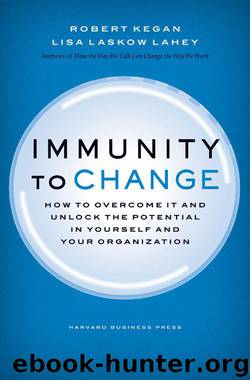Immunity to Change: How to Overcome It and Unlock the Potential in Yourself and Your Organization (Leadership for the Common Good) by Robert Kegan & Lisa Laskow Lahey

Author:Robert Kegan & Lisa Laskow Lahey [Kegan, Robert]
Language: eng
Format: mobi
Publisher: Harvard Business Review Press
Published: 2009-02-14T14:00:00+00:00
My definition of “letting down” is now different. Before it was about doing, and now it’s about being—like if I didn’t speak up, or share my insights. Now it’s the act of having the insights. I would be letting myself down if I no longer had the insights or didn’t believe that they are of value.
Another of my original big assumptions was “I assume that a good team member—for everyone—is giving 110 percent.” I still believe it. What’s changed is that percent is not about checking off tasks and making sure everything is perfect. Perfection isn’t about crossing every t. It’s about perfect in concept, intent, and in thinking about it.
Another original assumption was “I assume a good me is 150 percent.” I still think that’s true. It’s just defined differently. Even if it’s three minutes, it’s a sense that I determined the necessary energy and time that was appropriate. It’s the amount of time and quality of thinking that makes for excellence.
My biggest big assumption was: “I assume that it’s worth the risk for me to burn out than to not go the 110 percent.” That’s simply not true now.
Cathy’s process up to this point was more dramatic and compressed than most (surely, you don’t need to be hospitalized to overturn an immunity!). Her mindset changed very quickly, which perhaps is a silver lining of her Houston incident. This was her view: “I’m glad that this hospitalization happened. I otherwise wouldn’t have had to listen to myself.” But had the test of her big assumptions not been thrust upon her so dramatically, our view is that she could just as surely, if more slowly, have come to the same realizations through the more methodical, less dramatic process of successively running a series of graduated experiments, as we have now seen many, many people do.
Download
This site does not store any files on its server. We only index and link to content provided by other sites. Please contact the content providers to delete copyright contents if any and email us, we'll remove relevant links or contents immediately.
Hit Refresh by Satya Nadella(9110)
The Compound Effect by Darren Hardy(8909)
Change Your Questions, Change Your Life by Marilee Adams(7721)
Nudge - Improving Decisions about Health, Wealth, and Happiness by Thaler Sunstein(7681)
The Black Swan by Nassim Nicholas Taleb(7091)
Deep Work by Cal Newport(7044)
Rich Dad Poor Dad by Robert T. Kiyosaki(6580)
Daring Greatly by Brene Brown(6492)
Principles: Life and Work by Ray Dalio(6389)
Playing to Win_ How Strategy Really Works by A.G. Lafley & Roger L. Martin(6190)
Man-made Catastrophes and Risk Information Concealment by Dmitry Chernov & Didier Sornette(5982)
Digital Minimalism by Cal Newport;(5741)
Big Magic: Creative Living Beyond Fear by Elizabeth Gilbert(5729)
The Myth of the Strong Leader by Archie Brown(5482)
The Slight Edge by Jeff Olson(5400)
Discipline Equals Freedom by Jocko Willink(5361)
The Motivation Myth by Jeff Haden(5194)
The Laws of Human Nature by Robert Greene(5139)
Stone's Rules by Roger Stone(5066)
